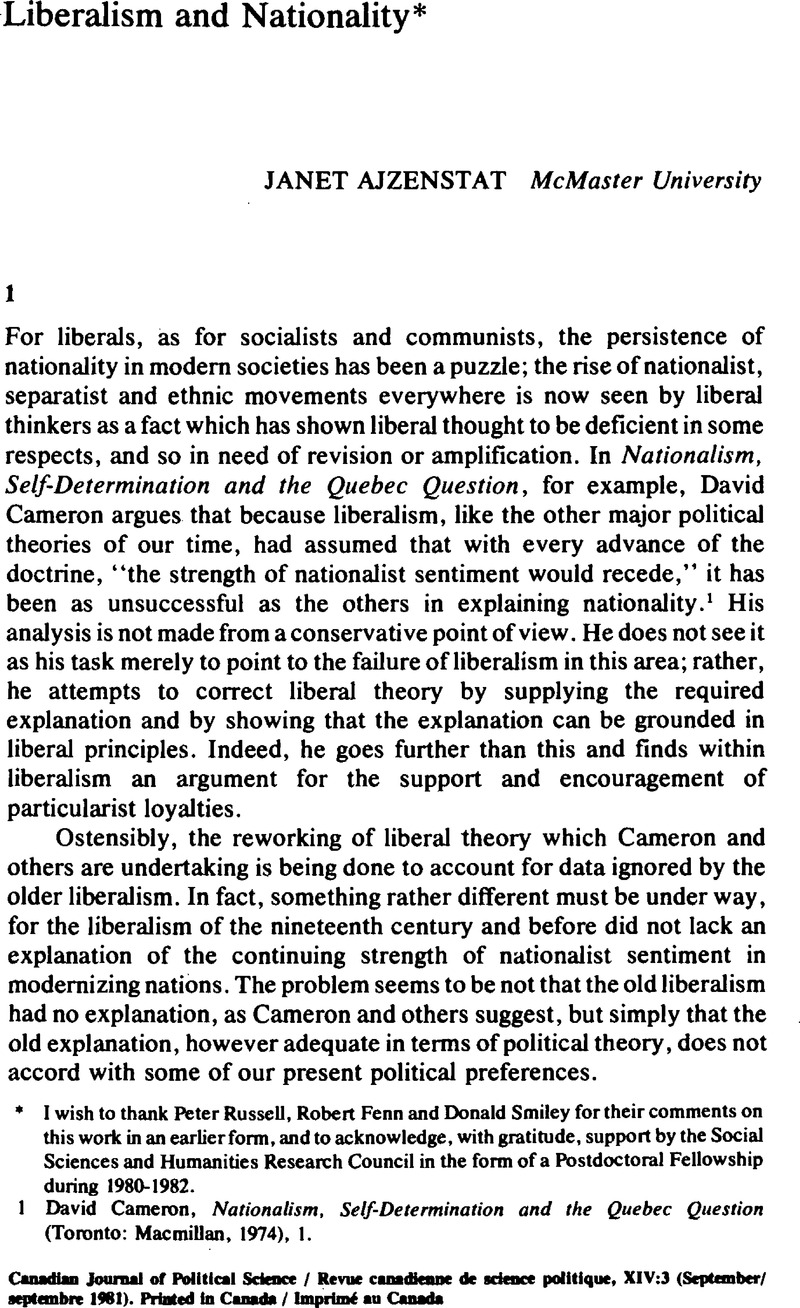No CrossRef data available.
Published online by Cambridge University Press: 10 November 2009

1 Cameron, David, Nationalism, Self-Determination and the Quebec Question (Toronto: Macmillan. 1974), 1Google Scholar.
2 Wade, Mason, The French Canadians, 1760–1967, Vol. 1 (Toronto: Macmillan, 1968), 184–214Google Scholar; and Burroughs, Peter, The Canadian Crisis and British Colonial Policy, 1828–1841 (Toronto: Macmillan, 1972), 1, 5, 103Google Scholar.
3 French-speaking commentators, from Etienne Parent in Durham's time to Michel Brunet, have treated Durham's argument with greater seriousness.
4 Means, Gordon, “Human Rights and the Rights of Ethnic Groups—A Commentary, ” International Studies Notes 1 (1974), 12Google Scholar. Means lists as among the analysts who agree “that a modern society is one that has sufficient cultural homogeneity … that public rights and public policies can be universal, ” F. Tönnies, F. X. Sutton, Talcott Parsons, Fred Riggs, David Apter and “a host of others.”
5 Lucas, C. P. (ed.), Lord Durham's Report on the Affairs of British North America. Vol. 2 (Oxford: Clarendon Press, 1912), 31Google Scholar. All references to the Report are to the text in volume two of this edition, cited as Report.
6 Report, 15, 212–18, 261, 265–66.
7 Ibid., 38, 170, 289, 303.
8 Lord Durham's Report, An Abridgement of Report on the Affairs of British North America by Lord Durham (Toronto: McClelland and Stewart, 1963), xGoogle Scholar.
9 Lucas, Lord Durham's Report, Vol. 1, 281.
10 Means, “Human Rights and the Rights of Ethnic Groups, ” 12.
11 Glazer, Nathan and Moynihan, Daniel, “Why Ethnicity?” Commentary 58 (1974), 33Google Scholar.
12 Cameron, Nationalism, Self-Determination and the Quebec Question, 8.
13 Report, 295.
14 Ibid., 14, 27.
15 Posgate, Dale and McRoberts, Kenneth, Quebec, Social Change and Political Crisis (Toronto: McClelland and Stewart, 1976)Google Scholar.
16 Ibid., chap. 6, esp. 99–105. In the revised edition (1980), the authors move part way toward retracting this argument. It is true that the passages referred to remain intact in the new edition and still convey the idea that nationalism is the product of elites, but elsewhere, especially in the first chapter and the conclusion of the new edition they now wish to argue that nationality—national consciousness—is not the consequence of elite activity, but an independent, long-established factor motivating elites. In Chapter 6, then, they describe national consciousness as used by the middle class to “legitimize its own aspirations” (100), while elsewhere they depict social change as undertaken to protect the national identity. In keeping with this shift they have moved toward abandoning the development and modernization model, but again only part way. They still rely on it, but they doubt its efficacy (ix, 3, 6, 22, 265).
17 Ibid., 24; revised edition, 31.
18 Report, 31, 289, 27.
19 Ibid., 289, 292.
20 Ibid., 38, 37, 46.
21 Ibid., 63.
22 Ibid., 301.
23 Ibid., 35, 36.
24 Ibid., 71.
25 Ibid., 22.
26 Ibid., 58.
27 Ibid., 59.
28 Ibid., 21.
29 Ibid., 48.
30 Ibid., 23, 36.
31 Ibid., 23, 48, 24.
32 Ibid., 25, 26.
33 Ibid., 135.
34 “Report of the Commissioner of Enquiry into the State of Education in Lower Canada, ” in Lucas, Lord Durham's Report, Vol. 3, 266.
35 Report, 31–33, 58.
36 Ibid., 33.
37 Ibid., 26, 30.
38 Durham comes to this conclusion in large part as a result of his own observations, as has been indicated. These observations may have been guided, or confirmed, by reports submitted to him by an aide, Stewart Derbishire. Derbishire, looking for a “grievance” to explain the rebellion of 1837, found none, that is, no practical matter of complaint which could be remedied by the home government. He attributed the rebellion to the appeal made by Papineau and his “confederates” to “the nationality of this vain people” (Public Archives of Canada, MG24, A 27, Vol. 37 [microfilm C1858], 33).
39 Report, 33.
40 Ibid., 82, 83, 286, 287.
41 Ibid., 51, 38.
42 Ibid., 51.
43 Ibid., 62, 61.
44 Ibid., 17, 72, 58.
45 Ibid., 305
46 Ibid., 312
47 Ibid., 299.
48 Ibid., 27, 19.
49 Rioux, Marcel, Quebec in Question (Toronto: James Lorimer, 1971), 113Google Scholar.
50 Cameron, Nationalism, Self-Determination and the Quebec Question, 3.
51 Berger, Peter, Berger, Brigitte, Kellner, Hanfried, The Homeless Mind: Modernization and Consciousness (New York: Vintage Books, 1973)Google Scholar.
52 Cameron, Nationalism, Self-Determination and the Quebec Question, 8.
53 Morin, Claude, Quebec versus Ottawa: The Struggle for Self-Government, 1960–72 (Toronto: University of Toronto Press, 1976), 154–155Google Scholar.
54 Posgate and McRoberts, Quebec, Social Change and Political Crisis, revised edition, 23.
55 “Lord Durham and the Assimilation of French Canada, ” in Penlington, Norman (ed.). On Canada: Essays in Honour of Frank H. Underhill (Toronto: University of Toronto Press, 1971), 53Google Scholar.
56 See Enloe, Cynthia, Ethnic Conflict and Political Development (Boston: Little, Brown, 1973) for an amplification of the idea of nationality as styleGoogle Scholar.
57 Tocqueville, Alexis de, De la démocratie en Amérique, Oeuvres complètes, Vol. 1, Mayer, J.-P. (ed.), (Paris: Gallimard, 1951–1962), 429, 430Google Scholar.